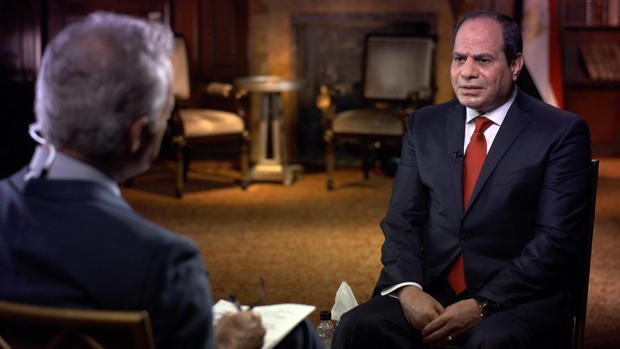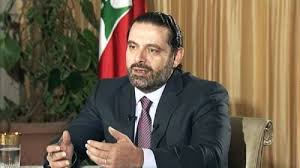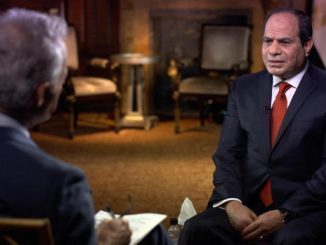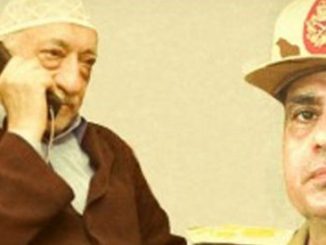
On 8 January, The Washington Post published an important article titled: “Why Egypt’s President Sisi is scared of CBS”. The article was written by Yehia Hamed* who served as minister of investment in the government of Mohamed Morsi, Egypt’s first democratically elected president. The article goes as follows:
It is telling that, only shortly after President Abdel Fatah al-Sissi sat down with the U.S. broadcaster CBS, the Egyptian government tried to prevent the interview’s release. Enticed to take part in a “60 Minutes” interview through an appeal to his vanity, Sissi quickly realized that the questions — and his answers — were not the ones he wanted the world to see. It was embarrassing to watch. He was clearly not prepared for the interview, and that his team tried to prevent its release simply made it into an even bigger story.
His claims were astonishing. Throughout the interview, he made assertions widely known to be untrue. He claimed, for instance, that “we don’t have political prisoners” in Egypt. Yet Human Rights Watch, Amnesty International and dozens of other organizations have closely documented Sissi’s human rights violations since he took power in 2013. All have found that people from all political backgrounds, as well as the unaffiliated, are represented in vast numbers in Egypt’s prisons — including ex-president Mohamed Morsi (in whose government I had the privilege to serve).
The denials did not stop there. When asked about the massacres in the al-Nahda and Rabaa squares in 2013, Sissi thought he could defend his actions by claiming that the damning Human Rights Watch report on the killings was not “sound.” On his orders, more than 800 people were murdered in cold blood for the crime of peaceful protest. His response to this was to imply that CBS is not “closely following the situation in Egypt” before contradicting himself by saying he “tried every peaceful means to disperse” the protesters.
And having previously denied Egypt and Israel are working together in the Sinai Peninsula, where Sissi’s “hidden war” on civilians amounts to a “looming humanitarian crisis,” he admitted to CBS that they were, in fact, cooperating. In February 2018, as part of his effort to portray himself as a modern, pro-Arab and anti-Israel leader in the mold of General Gabal Abdel Nasser, Sissi had told the New York Times there was no military relationship.
So we shouldn’t be surprised he demanded that CBS pull the show. As he lied his way through the interview, his discomfort was plain to see. He was visibly sweating, and his responses became increasingly defensive. Faced with a free media, he showed himself to be sensitive, fragile and fearful of being held accountable for his crimes. Emboldened by the support of people such as President Trump and encouraged by the tacit tolerance of other Western leaders, Sissi has long promoted the narrative that he is in some way “fighting extremism,” believing it grants him carte blanche to do as he pleases. Appearing on “60 Minutes,” he apparently believed he would receive treatment befitting this role and that of “a great friend and ally” to the United States, to quote Trump. Instead, he was confronted with his actions.
Attempting to prevent the interview from airing was an act of desperation. It was also driven by a profound delusion. Under Sissi’s suffocating regime, there is no free press in Egypt, just as there is no free expression of opinion or art or literature. The increasingly arbitrary war his government has waged on all perceived dissenters and “enemies of the state” has produced a national atmosphere that resembles an “open-air prison.” But the paranoid and bullying tactics he has employed in Egypt do not work on U.S. broadcasters. Sissi has been too used to getting his way, so absolute is his grip on Egypt.
Since the interview aired, all domestic media in Egypt has been barred from any kind of reporting on it. Egyptians in Egypt will be too scared to even talk about it, but for those of us living in exile, it has become another reason for us to continue opposing his regime.
There is one issue we cannot overcome alone. So long as the main international powers remain silent, Sissi will remain content with his actions. Together, Saudi Arabia, the United Arab Emirates and Egypt have made sure the West has commercial and political interests in the Middle East. Trump has even supported him. For this reason, human rights organizations and the free media must put sustained pressure on Sissi to answer for his crimes.
At one point during the interview, Sissi is asked directly whether he ordered his men to open fire on protesters. He gives no answer, but the answer is obvious. The truth is that he did indeed orchestrate the mass killing of men and women, many of them young. The interview debacle with Sissi on “60 Minutes” should warn dictators everywhere that although they might enjoy the support of politicians from democratic nations, it is the people and the press that will hold them to account.
*Yehia Hamed now runs the Global South Forum for International and Economic Dialogue based in Istanbul.



